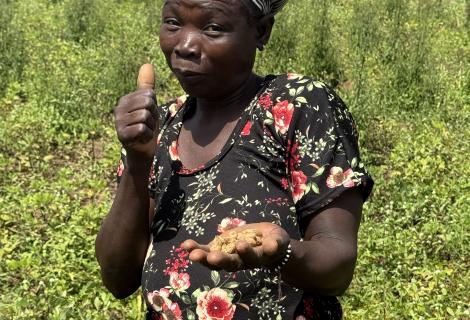Pavuu Women: Defying the Odds and Advancing Food Sovereignty through Conservation Agriculture under the EU-REACH-funded CAPs Project

In the quiet village of Pavuu, nestled southeast of Lawra in Ghana’s Upper West Region, women farmers are rewriting their story. Once burdened by erratic rainfall, declining soil fertility, and the harsh impacts of climate change, these women are now cultivating hope, quite literally through conservation agriculture and sustainable water management.
Located about five miles from Lawra, Pavuu has long struggled with unpredictable weather patterns that make rain-fed farming nearly impossible. Key groups who have been harshly affected by these are women. Over 600 women, including widows, persons with disability whose livelihoods have been shuttered, leaving their households heavily underinsured. In a recent intervention, the community has commended ActionAid Ghana and the EU-funded CAPs initiatives.
Pavuu borehole is part of the 60 boreholes provided for 60 communities as part of achieving resilience in sustainable water management for rural households.
EU-REACH CAPs Project and Its Alignment with ActionAid Ghana’s Strategic Priorities.
The Resilience Against Climate Change Project (REACH) is implemented by GIZ under the Market Oriented Value Chains for Jobs and Growth in the ECOWAS Region (MOVE) and co-funded by the European Union (EU) and the German Federal Ministry for Economic Cooperation and Development (BMZ). The REACH project drives the transformation towards climate resilient agricultural production and improved livelihoods in North-West Ghana.
Within this framework, ActionAid Ghana (AAG) leads the “Strengthening Community Resilience through Community Action Plans (CAPs)” component across 111 communities in the Upper West and Savannah Regions.
The project has delivered 141 interventions centered on sustainable water management, forest restoration, and soil health improvement-all critical to AAG’s mission of advancing social justice, gender equality, and climate resilience.
Building Climate-Resilient Farms
Through 28 demonstration fields, farmers have been trained in conservation agriculture (CA), soil erosion control and compost production techniques. Practices such as cover cropping, minimal tillage, composting, and agroforestry. These practices improve soil fertility, reduce erosion, and increase productivity. ActionAid’s collaboration with District Departments of Agriculture has ensured hands-on farmer training and field days that have equipped hundreds of smallholder farmers, especially women with practical CA skills.
Inclusive Green Livelihoods for Vulnerable Groups
To ensure no one is left behind, the CAPs project has deliberately targeted widows and Persons Living with Disabilities (PLWDs) who are often excluded from agricultural initiatives.
180 women (including 45 widows and 45 PLWDs) received 20 kg each of improved cover crop seeds such as cowpea, groundnut, and soybean.
616 vulnerable women (308 widows and 308 PLWDs) each received 17 grafted mango and cashew seedlings, totaling 10,472 seedlings distributed to 616 women.
These beneficiaries are now applying CA techniques on their farms, using proceeds from group demonstration plots to strengthen their Village Savings and Loans Associations (VSLAs). The agroforestry component not only restores ecosystems but also enhances women’s long-term income and economic independence.
Aligning with ActionAid Ghana’s Strategic Priorities
The CAPs initiative strongly aligns with ActionAid Ghana’s Country Strategy Paper VII (CSP VII) under Strategic Priority Area One: Green Economy and Resilience. It directly contributes to:
• Promoting agroecology and food sovereignty through climate-resilient farming.
• Expanding green livelihood opportunities for women and marginalized groups.
• Enhancing women’s access to productive resources, including economic trees and improved seeds.
• Advancing climate justice and adaptation actions at the community level.
The EU-REACH-funded CAPs Project initiative showcases how inclusive green livelihood promotion can empower vulnerable groups while restoring degraded ecosystems. Through strong collaboration among ActionAid Ghana, GIZ, the European Union, BMZ, and local authorities, the project is driving progress toward a fairer, more climate-resilient agricultural system.
ActionAid Ghana remains committed to deepening these partnerships to expand green livelihood opportunities and close the gender gap in agriculture.
Written by Sebastian Alesane and Jacqueline Parditey.
Writers are Project Officer (CAPs Project) & AAG, PR and Comms Officer.